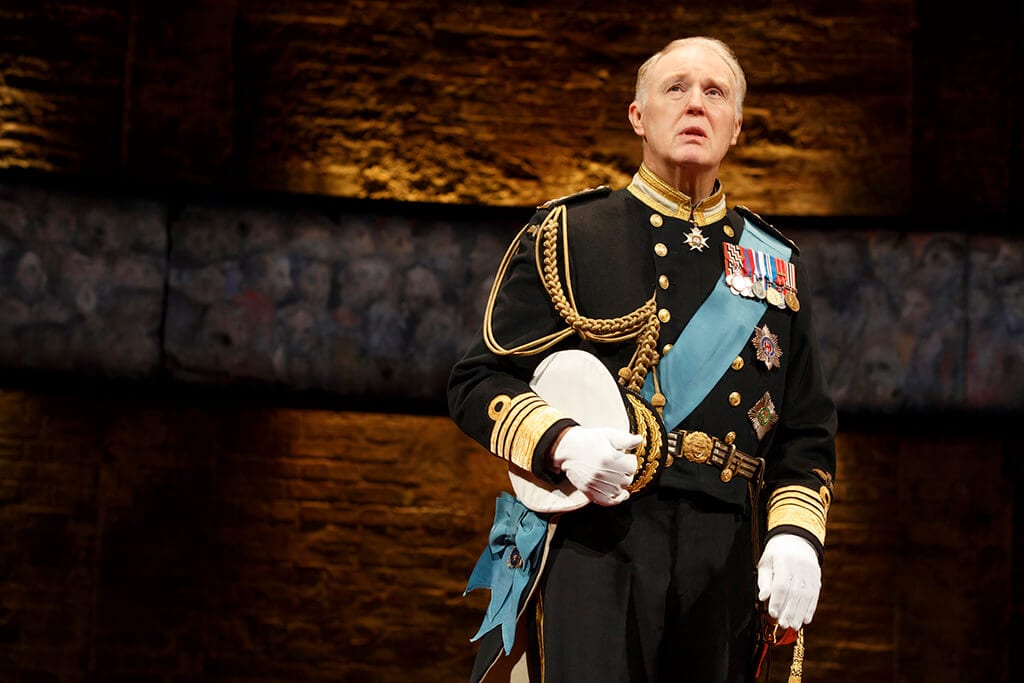I kept thinking about the various people I know who would adore seeing “King Charles III,” the naughty, absorbing, and thrillingly well-acted new play that just opened here on Broadway about the possible fates of the current British royals.
There was my friend Jacque, who teaches Shakespeare, and who relishes dramas about the ambitions and passions that guide the lives of figures large and small. There was my neighbor, Joyce, a Texan but self-proclaimed Anglophile, who refused to visit her sister in Alabama because she wanted to stay home and watch the queen’s Golden Jubilee on her own TV. And there was my husband, an actor and a student of acting, who would surely savor the stunningly naturalistic way that Richard Goulding, playing the twentysomething Prince Harry, disported himself on the stage, sulking, slouching, and dashing off with childishly little pretext to a club on the very eve of his grandmum’s demise. I myself spent much of the evening captivated by the performance of the masterful Tim Piggott-Smith who, as the eponymous Charles, delivers a humane, touching portrait of a man who has waited his entire life for the opportunity to make his mark, to ascend to power, to do at last what he was born for – but who, when the occasion arrives (note that the play’s subtitle is “A Future History Play”) discovers himself to be buffeted by forces stronger, perhaps, than he can ever master.
For, at the center of this evening in the theater is a sort of existential dilemma. We have a man for whom the time is out of joint. His moment has arrived, but it is a moment in which the royals are, obviously, a kind of glorified window-dressing. Can this cogent, decent man (for thus is Charles portrayed) actually make a contribution, follow the dictates of his aroused conscience, and, in particular, outmaneuver his own prime minister, who is, after all, supposed to minister to him?
Tim Pigott-Smith’s king is a man almost comically diminished and yet, for all that, with something of the sacred everyman about him. He seems an apt figure for 2015, ill suited to the historicized heraldry within which he finds himself, trying to locate his own particular unique self amidst the workings of outsize forces, a consciousness – Piggott-Smith is appealingly vulnerable in his soliloquies – that is forever being crowded into the peripheries, that is forever on the verge of being silenced.
This is a witty, delicious, and well structured play (by the able Mike Bartlett) and comes to us thanks to Britain’s Almeida Theatre. Written mostly in blank verse, with the occasional salient rhyming couplet, it plays utterly contemporary notes off its Shakespearean framework in a way that always feels fleet. The production contains interludes that feature an enthralling score by Jocelyn Pook, evoking by turns Philip Glass and Gregorian chant, but with a portentous swell that serves as a kind of contemporary Greek chorus for the action.
The cast is almost always fascinating to watch, with Oliver Chris as the grounded, alert William who must choose his own way to matter, Margot Leicester as a frumpy, forcefully supportive Camilla, Richard Goulding as the conflicted partier Harry, and the very convincing Tafline Steen as Harry’s working-class girlfriend, Jess, embodying a reality check from the real world. Lydia Wilson looks just right as Kate, here a plotting, willowy Lady Macbeth, even as her performance seems rather metallic and emotionally vacant. Yet even with this almost uniformly stellar cast, one feels afterwards, walking up the pavement away from the theater, a bit as if one has been watching simulacra – all the gestures onstage are perfect, so eerily lifelike, and yet, with the exception perhaps of Piggott-Smith’s marvelous Charles, they leave the audience feeling entertained and intellectually rewarded but only evanescently moved. Still, “King Charles III” is, all in all, extremely enjoyable theater, rewarding even for those of us who have no particular appetite for royal hi-jinx and guaranteed irresistible catnip for the many folks who, even in the U.S., love stories of royals, absurd or grand, and love imagining that they matter.

